College of Science, Engineering & Technology
Head of iNanoWS celebrates C3-rating for outstanding body of research
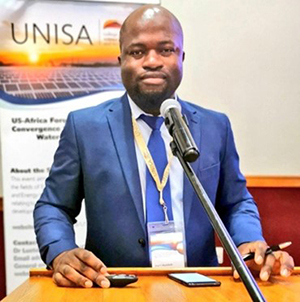
Prof Thabo Nkambule, Head of the Institute for Nanotechnology and Water Sustainability
Unisa holds in high regard research with societal impact. Its academics are often encouraged to seek research opportunities and mentor students to become notable scholars in their research. One academic that takes this effort to heart is Prof Thabo Nkambule who is the Head of the Institute for Nanotechnology and Water Sustainability (iNanoWS) in the College of Science, Engineering and Technology.
Nkambule is an NRF C3-rated researcher who is also registered with the South African Council for Natural Scientific Professions (SACNASP) as a professional Natural Scientist (Pr.Sci.Nat.) and a member of the Water Institute of Southern Africa (WISA), the International Water Association (IWA) and the American Chemical Society (ACS).
iNanoWS is a research institute at Unisa which innovatively seeks to address current and emerging issues relating to water quality and water scarcity. It is also a wellspring of top-flight research which boasts a state-of-the-art infrastructure for the training of master’s and doctoral students by a dynamic team of excellent academics who collaborate with local and international experts in their research endeavours.
Nkambule’s research interests are in natural organic matter in engineered water treatment systems; the urban water cycle; conventional, advanced and integrated water treatment technologies; and nanotechnology for water treatment and water sustainability. Research on the urban water cycle and water treatment technologies entails embarking on research whose end goal is the understanding of the key elements of the urban water cycle, understanding the global drivers for urban water management, and, finally, developing new and innovative water treatment technologies that complement existing conventional water treatment technologies.
The NRF’s C-rating is awarded to established researchers with a sustained recent record of productivity in the field who are recognised by their peers as having produced a body of quality work, the core of which has coherence and attests to ongoing engagement with the field, and has demonstrated the ability to conceptualise problems and apply research methods to investigating them. "Having attained the C3-rating therefore brings great pride to me as a researcher as well as the Institute at large at the recognition of the calibre of research we embark on. Additionally, the rating enhances the confidence of our industrial partners, research peers as well as all stakeholders in the relevance, practicality and contributions of our offerings to the community. I therefore without doubt believe that this rating will enhance my academic standing, professorial contribution to the field of nanotechnology and water sustainability. Ultimately, I am confident that it contributes to the broader research strategy of iNanoWS, CSET and Unisa towards scientific leadership both nationally and internationally that is enshrined in our strategic intents as a university shaping futures in the service of humanity. This accomplishment is also largely a result of the considerable efforts of my students and postdoctoral fellows as well as my many collaborators for which I am truly grateful," explains Nkambule.
Research focus
To date, Nkambule has worked extensively on the three questions of water treatment in relation to the presence of natural organic matter (NOM) in source waters: (1) What is the character of NOM in the source water? (2) How will the presence of different characters and composition of NOM affect the choice of water treatment processes for the production of safe drinking water? (3) Can methods be developed that would enable the mitigation of the challenges presented by the presence of problematic NOM fractions in various source waters? "Since September 2014," he says, "I have been employed at Unisa, where I lead a research team that has been championing the profiling and understanding of the character of NOM in South African water sources, as well as being involved in research efforts that aim to improve the efficiency of drinking water treatment plants in Southern Africa."
He explains: "I did my PhD at the University of Johannesburg under the mentorship of Prof Bhekie Mamba (now Executive Dean of CSET). It was at that time that I was introduced to research in the urban water cycle via a Water Research Commission (WRC) Funded project, whose project leader was Mamba. Upon completion of my PhD in 2012, I proceeded to do a one-year postdoctoral fellowship with the Technical University of Delft (TuDelft) in the Netherlands. TuDelft is one of the leading universities in the world on research in water treatment under the urban water cycle thematic area. When I was appointed as a Senior Lecturer at Unisa in 2014, one of my core responsibilities was to establish the thematic area for research on the urban water cycle and water treatment technologies, as I had special training in that field."
Research highlights and achievements
Nkambule currently supervises a team of 14 master’s and doctoral students at Unisa. As a lead researcher and supervisor, he - together with the students and colleagues he collaborates with - has co-authored and published over 62 papers in peer-reviewed journals and has published three technical reports for research projects that were funded by the Water Research Commission (WRC) of South Africa. In addition, to internationalise his research and make it globally competitive, he has initiated collaborations with national and international scholars in the area of the urban water cycle, modelling of organic contaminants removal in water treatment processes, and has developed innovative solutions for water treatment processes. These collaborations involve joint conceptualisation of research projects for addressing research problems, including strategising, planning, designing and implementing, and the joint supervision of postgraduate students. Having graduated seven masters, two PhD students and having mentored four post-doctoral fellows, Nkambule says: "I take pride in working with postgraduate students and seeing them grow towards becoming future scholars. After all, as Mme Charlotte Maxeke once said: 'This work is not for yourselves – kill that spirit of self, and do not live above your people but live with them. If you can rise, bring someone with you.'"
Nkambule is also an awardee of Unisa’s VisionKeepers grant for 2019/2021 and a recipient of numerous research grants such as one from the Water Research Commission (WRC) of South Africa and the Eskom Tertiary Educations support programme.
He adds with pride that another greatest highlight was the Exco of Council’s approval on 5 June 2020, for the institutionalisation of the iNanoWS to which he was appointed Head as from 1 January 2021. "Having been one of the two staff members with whom Prof Mamba founded NanoWS in September 2014, this news was received with warmth and a sense of pride since this was a realisation of a vision, preceded by a six-year period of extensive hard work by the team of iNanoWS staff members, 15 postdoctoral fellows and 67 masters and doctoral students," he concludes.
* By Tshimagadzo Mphaphuli, Senior Journalist, Department of Institutional Advancement
Publish date: 2021-04-14 00:00:00.0

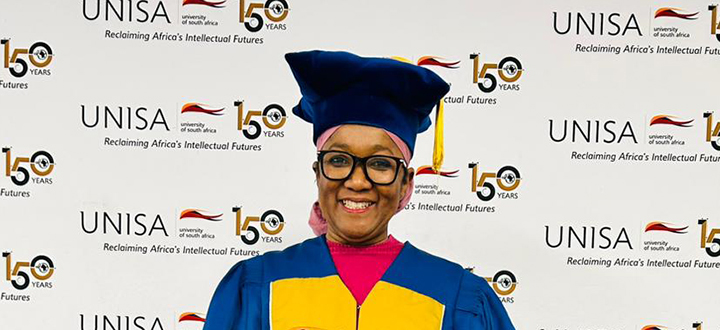 Unisa community engagement initiative targets school underperformance
Unisa community engagement initiative targets school underperformance
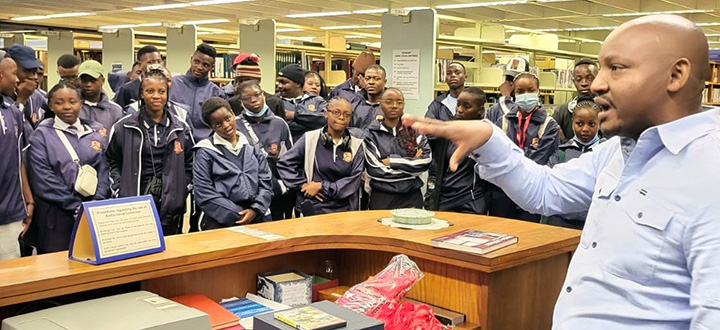 Library tour introduces learners to the wonderful world of Unisa
Library tour introduces learners to the wonderful world of Unisa
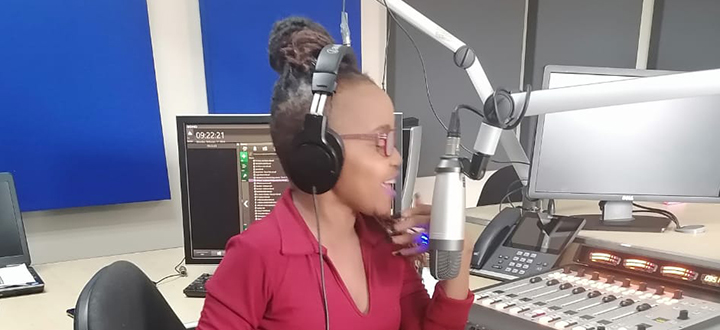 Unisa Radio volunteer wins prestigious community journalism award
Unisa Radio volunteer wins prestigious community journalism award
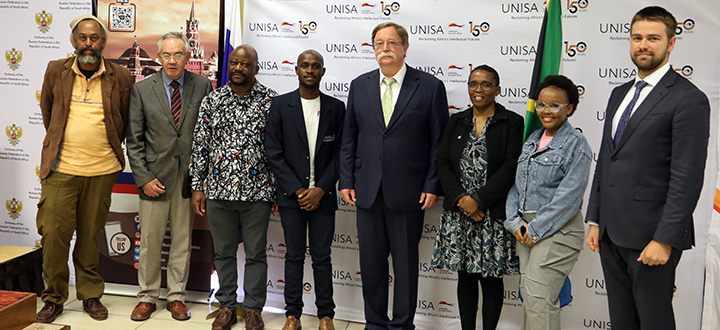 Unisa's student leadership engage with Russian ambassador
Unisa's student leadership engage with Russian ambassador
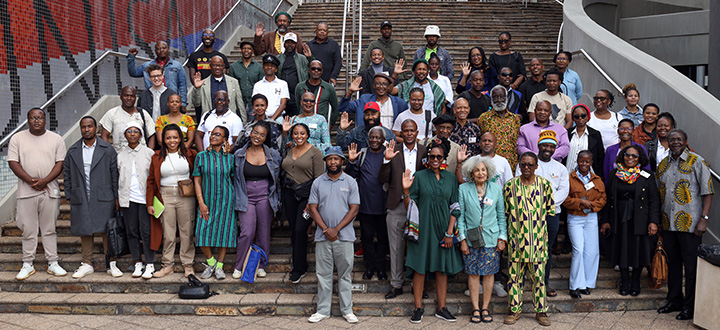 Re-igniting and re-imagining Pan Africanism, Afrocentricity and Afrofuturism in the 21st century
Re-igniting and re-imagining Pan Africanism, Afrocentricity and Afrofuturism in the 21st century